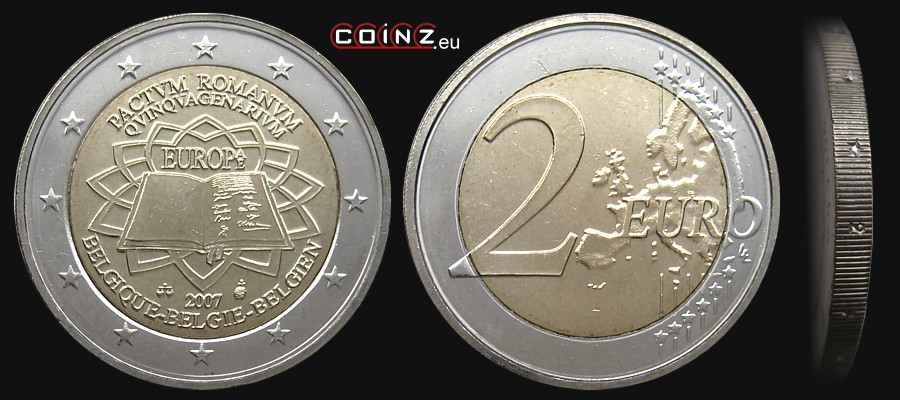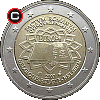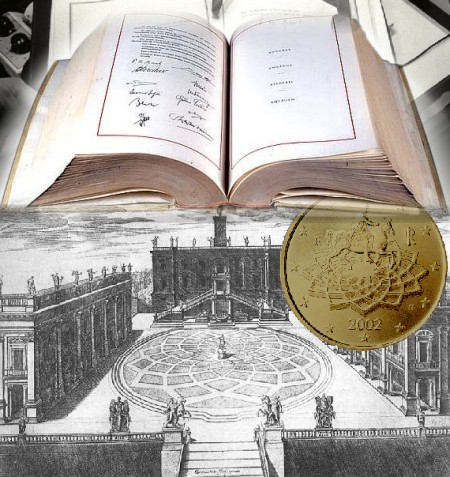2 euro BELGIUM (2007) 50th anniversary of Roman Treaties


| diameter: | weight: | thickness: | alloy: |
| 25.75 mm | 8.5 g | 2.22 mm | Cu75Ni25/Cu75Zn20Ni5 |
obverse:
in the coin centre an opened book of the Treaties of Rome; above: EUROPAE (Europe in Latin); in the background paving of the Piazza del Campidoglio in Rome; below year of issue: 2007; along the top edge in two lines: PACTVM ROMANVM / QVINQVAGENARIVM (fifty years of the Treaties of Rome in Latin); along the bottom edge: BELGIQUE–BELGIE–BELGIEN (Belgium in French, Dutch and German); at the edge a ring of twelve five-pointed stars - symbol of the European Union
reverse:
edge:
reeded with concave inscription: 

issue date:
25 III 2007
withdrawal date:
still in circulation
designer:
common proposal of European mints, Luc Luycx (initials LL below letter 'O' in EURO on the reverse)
mint:
 De Koninklijke Munt van België (in Dutch) / La Monnaie Royale de Belgique (in French) (The Royal Belgian Mint), Brussels (mintmark after year of issue on the obverse, before year of issue a privy mark of mint's chief Romain Coenen)
De Koninklijke Munt van België (in Dutch) / La Monnaie Royale de Belgique (in French) (The Royal Belgian Mint), Brussels (mintmark after year of issue on the obverse, before year of issue a privy mark of mint's chief Romain Coenen)
mintage:
| 2007 | 5 000 000 | + 20 000 in boxed sets |
privy marks:
We are presenting below privy marks of The Royal Belgian Mint directors, which appear on Belgian coins of euro:
| Romain Coenen | 1988-2009 |  |
scale |
| Serge Lesens | 2010-2012 |  |
feather |
| Bernard Gillard | from 2013 |  |
cat |
interesting facts:
The design of the obverse of the coin commemorating 50th anniversary of the Treaties of Rome was selected in a result of the designing competition for European mints. The contest was settled by a three-person committee consisting of: Joaquín Almunia (Spanish, contemporary European Commissioner for Economic and Monetary Affairs), Pervenche Berès (French, contemporary European Parliament member) and Jean-Claude Juncker (Luxembourgish, contemporary President of the Eurogroup). It seems that none of the proposals impressed the committee, because eventually the official sources say that the coin obverse is the result of common work of all European mints.
The obverse shows the treaties signed by six founding members of the European Economic Community placed on a background of paving of the Piazza del Campidoglio in Rome, where on March 25, 1957 the treaties were signed. Above this motive an inscription "50 years of the Roman Treaties" and "Europe" as well as the name of the country were written in national languages of the issuing countries (or in Latin). Thus the inscriptions on the obverse differ from country to country, but the central motif stays the same.
The image of the Piazza del Campidoglio in Rome is used on another European coin - Italian 50 euro cent.
The book of the Treaties of Rome, a view of the Piazza del Campidoglio in Rome and the Italian 50 euro cent obverse.

The obverse shows the treaties signed by six founding members of the European Economic Community placed on a background of paving of the Piazza del Campidoglio in Rome, where on March 25, 1957 the treaties were signed. Above this motive an inscription "50 years of the Roman Treaties" and "Europe" as well as the name of the country were written in national languages of the issuing countries (or in Latin). Thus the inscriptions on the obverse differ from country to country, but the central motif stays the same.
The image of the Piazza del Campidoglio in Rome is used on another European coin - Italian 50 euro cent.
The book of the Treaties of Rome, a view of the Piazza del Campidoglio in Rome and the Italian 50 euro cent obverse.

Last update: 9 X 2012
coins catalogue :: katalog monet :: münzkatalog :: catalogue de monnaies :: catálogo de monedas :: catalogo monete :: каталог монет :: κέρματα κατάλογος :: COINZ.eu
© 2010-2025 :: Adam Kubicki :: COINZ.eu :: All rights reserved.


